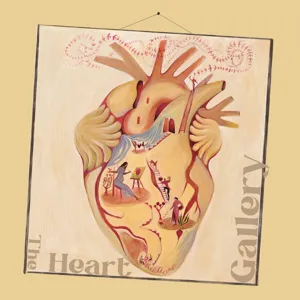Métis artist Christi Belcourt on how to "make things right" in Canada

This episode of The Heart Gallery will take you into the history and ongoing realities of Indigenous affairs in Canada. Recent years have shed light on a painful and violent history, as well as present-day systemic challenges. From the harrowing legacy of the residential school system, which remained active until the 1990s, to the continuous struggles over land rights and cultural preservation, these unfolding revelations have sparked crucial national and international dialogues. They compel us to face uncomfortable truths and prompt a critical re-examination of the process of truth and reconciliation.
Against this backdrop, I’m privileged to interview Christi Belcourt, an artist whose work is deeply entwined with her Métis community's stories. Christi’s art does not merely reflect Métis cultural practices and deep connection to nature; it resonates with the ongoing struggles and triumphs of indigenous people, offering a window into the soul of communities striving for justice.
We explore Christi's work while also talking about how the arts can be a conduit for expressing Indigenous voices and can play a valuable role in efforts to reveal systemic challenges.
I hope you enjoy this conversation.
Homework from Christi: "Do something that is completely selfless - and anonymous - in the aid of someone else."
Mentioned:
- Keetsahnak: our missing and murdered Indigenous sisters, edited by Christi Belcourt
- Medicines to help us: traditional Metis plant us, by Christi Belcourt
- Hearts of Our People: Native Women Artists exhibit
- Bob Marley's War
- Haile Selassie's speech Towards African unity, 1963
- Classically trained indigenous pianist Jeremy Dutcher
- Gregory Schofield, Canadian Métis poet, beadwork artist, dramatist and non-fiction writer.
- Odawa-Potawatomi artist Daphne Odjig
- And please see the blog post for visual accompaniment
Connect:
- Christi twitter
- Christi instagram
- The Heart Gallery Instagram
- The Heart Gallery website
- Rebeka Ryvola de Kremer Instagram
Credits:
Samuel Cunningham for podcast editing, Cosmo Sheldrake for use of his song Pelicans We, podcast art by me, Rebeka Ryvola de Kremer.